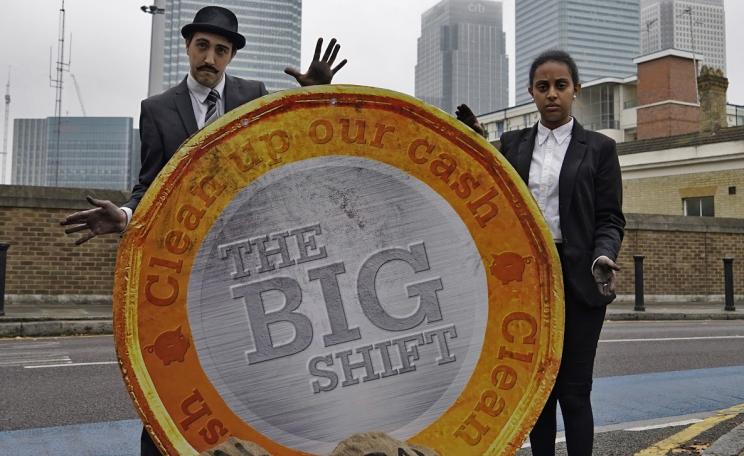Will Barclays ascend to an unexpected position of global leader on climate action? Not likely.
Barclays is due to publish an updated energy policy by the end of 2018.
Mary Francis, a non-executive director of Barclays, told shareholders that the bank's financing of 'extreme fossil fuels’ was under review, at the 2018 AGM in May.
Barclays now has the chance to make history by pushing the boundaries of climate action in private finance - in the same year that HSBC has excluded all tar sands from its financing regimen and Standard Chartered has excluded new coal-fired power stations,
Fuel markets
Barclays could totally transcend its reputation as being dismissive of concerns regarding ethics, sustainability and justice by introducing sector-leading policy outlawing all of the most extreme fossil fuels.
So far banks have acted on fossil fuels under pressure from NGOs and campaigners - but too often they have only moved on the fuels they have least exposure to.
For example, HSBC excluded tar sands, but its main market is Asia where coal is plentiful. Hence it's loophole allowing it to finance coal in the emerging markets of Vietnam, Bangladesh and Indonesia.
But will Barclays ascend to an unexpected position of global leader on climate action? Not likely.
Barclays’ primary market is North America where oil pipelines are big business. This was evidenced as Justin Trudeau's liberal administration nationalised Trans Mountain to force it through, and the violence used to repress those resisting the Dakota Access Pipeline.
It would take unprecedented moral leadership from a bank historically devoid of ethics to shun tar sands pipelines from its financing portfolio.
True leadership
If their new energy policy maintains business as usual, Barclays’ current leadership - Jes Staley, John McFarlane and Mary Francis - will at best be consigned to the footnotes of history. At worst, they will be recognised as the climate criminals they would be. But there's an alternative history.
Will Barclays ascend to an unexpected position of global leader on climate action? Not likely.
Barclays’ leaders can demonstrate to the rest of the finance world that climate breakdown is a serious enough crisis for banks to begin thinking in the long term. Rather than leaping from crisis to crisis, with some profits in between, they can contribute to building a sustainable financial system to cultivate a sustainable ecology.
Such a policy would exclude coal, tar sands and Arctic oil - as others have done - as a bare minimum. Anything less is criminal.
True leadership would take aim and oil and gas too. For too long institutions making divestment commitments have limited their exclusions to 'the worst fossil fuels’.
With 12 years to avoid irreversible catastrophe, any attempt to demarcate fossil fuels by relative badness is useless. They must all stay in the ground. Banks must stop financing them all.
Civil society
If banks continue to facilitate the most recent dash for gas taking place across Europe, they will lock our economies into carbon emissions causing catastrophic breakdown. If they continue to finance oil and all of the conflict and human devastation that goes with it, there's no going back to a liveable planet.
Barclays' energy policy must be positive too. To remain relevant socio-economic institutions, it should play its part in financing zero-carbon technology and infrastructure to lock our economies into renewables.
Considering the widespread suffering they've inflicted and profited from, it's time for banks like Barclays to defer to civil society and community organisations in these projects. We should be demanding they follow our lead when it comes to what just decarbonisation practically looks like for communities across the country and the world.
This might sound unrealistic. Probably. Is it ambitious? Yes. Is it necessarily? Absolutely.
Those leading banks like Barclays have a choice: depart from business as usual and remake the financial system in service of people and planet, or step aside and let the people have a turn at managing our own economic lives.
Ambitious policy
We shouldn't sit back, relax and hope that Barclays deliver. In the weeks before they announce the results of their review and in the months afterwards, we must make it crystal clear to Barclays we aren't going away.
Using a diversity of tactics we must throw everything we have at them.
Switch bank, and let them know why. Campaign for your university, workplace, church or local businesses to boycott Barclays. Get creative disrupting your local branch or other Barclays operations.
Ambitious energy policy excluding all fossil fuels is Barclays’ last chance to stay relevant before it becomes inevitable that we exert our collective power to take back control of the financial system and repurpose it to serve people instead of profit.
Barclays may not be about to make climate history. But we can.
This author
Chris Saltmarsh is co-director of climate change campaigns at People & Planet, where he manages the Divest Barclays and university divestment campaigns. He tweets at @chris_saltmarsh.







